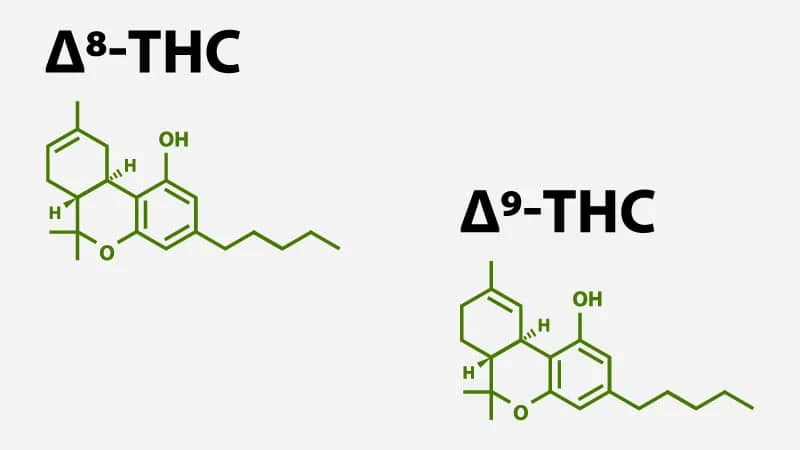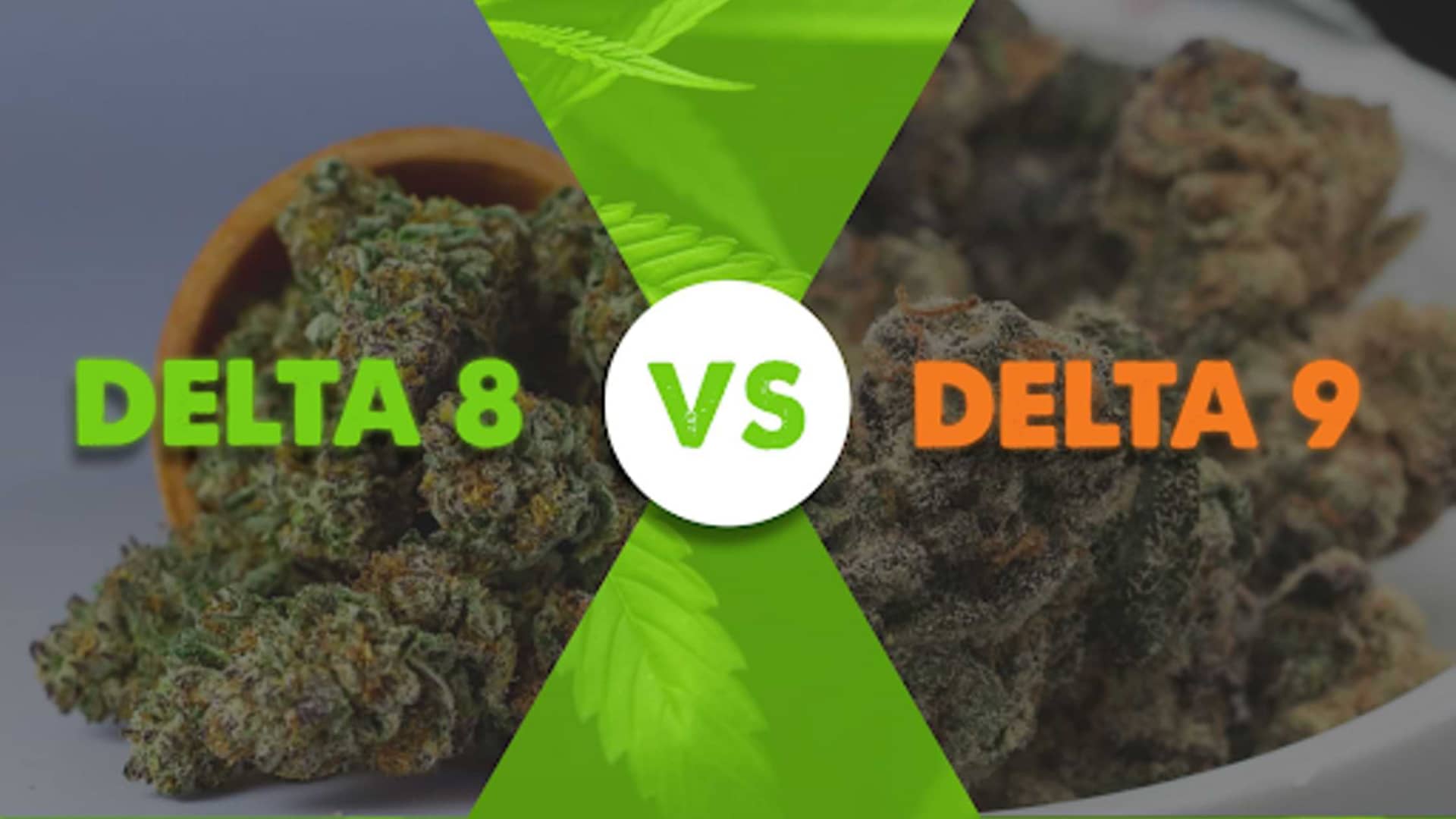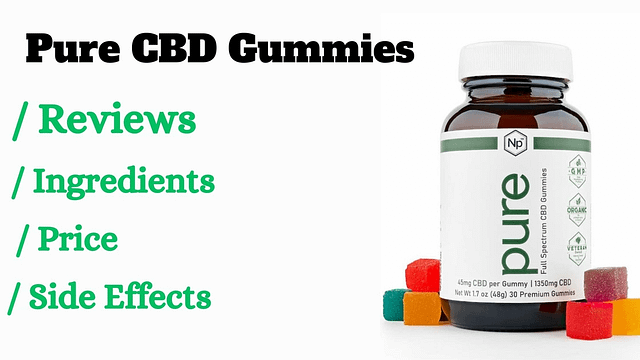Delta-8 tetrahydrocannabinol (Delta-8 THC) and delta-9 tetrahydrocannabinol (Delta-9 THC) are both cannabinoids, but they have distinct effects on the body. Delta-8 THC is less psychoactive than Delta-9 THC, offering a milder psychotropic experience. Beyond their psychoactive disparities, these compounds exhibit divergent characteristics. In recent years, Delta-8 THC has gained traction not only for its subtler high but also for potential medical applications. This comprehensive guide delves into their differing chemical structures, psychoactive effects, legal standings, medicinal potentials, and more. Let's explore the intriguing realm of Delta 8 vs Delta 9 THC.
Table of Contents
- 1 Chemical Structure and Composition
- 2 Psychoactive Effects
- 3 Delta 9 THC: A Potent Psychoactive Compound
- 4 Delta 8 THC: A Milder Alternative
- 5 Is Delta 8 and Delta 9 THC Legal ?
- 6 Medical Benefits and Uses
- 7 Potential Benefits of Delta 8 THC
- 8 Delta 9 THC's Medicinal Potential
- 9 Side Effects and Risks
- 10 How Do They Interact With The Endocannabinoid System ?
- 11 Availability and Products
- 12 User Experiences and Reviews
- 13 Delta 8 THC Users' Experiences
- 14 Delta 9 THC Users' Experiences
- 15 Comparison: Delta 8 vs Delta 9 THC
- 16 Conclusion
- 17 Frequently Asked Questions (FAQs)
- 18 1. What is Delta 8 THC, and how does it differ from Delta 9 THC?
- 19 2. Is Delta 8 THC legal everywhere?
- 20 3. Which is better for anxiety: Delta 8 or Delta 9 THC?
- 21 4. Do Delta 8 and Delta 9 THC show up on drug tests?
- 22 5. Can Delta 8 THC help with pain relief?
- 23 6. What are the potential long-term effects of Delta 8 and Delta 9 THC?
- 24 7. Are there specific medical conditions that Delta 8 THC is particularly effective for?
- 25 8. How do Delta 8 and Delta 9 THC affect memory and cognitive function?
- 26 9. Are there any interactions between Delta 8 or Delta 9 THC and other medications?
- 27 10. What is the current regulatory landscape for Delta 8 and Delta 9 THC products?
Chemical Structure and Composition

Delta 8 and Delta 9 THC share a similar molecular structure, with subtle differences that result in distinct properties. Both compounds contain a chain of carbon atoms, but the location of a double bond varies. In Delta 8 THC, the bond is found on the 8th carbon atom, while in Delta 9 THC, it's on the 9th carbon atom. This seemingly minor difference in structure can significantly affect how these compounds interact with our bodies.
Psychoactive Effects
Delta 9 THC: A Potent Psychoactive Compound
When it comes to psychoactive effects, Delta 9 THC is renowned for its potency in producing a “high.” Users often report intense euphoria, altered perception of time, and increased appetite.
Delta 8 THC: A Milder Alternative
On the other hand, Delta 8 THC offers a less intense psychoactive experience. It can induce a sense of relaxation and mild euphoria without the overwhelming effects often associated with Delta 9 THC.
Is Delta 8 and Delta 9 THC Legal ?
The legal status of Delta 8 and Delta 9 THC varies by location. Delta 9 THC is classified as a controlled substance in many regions, which can lead to legal issues for users and producers. In contrast, Delta 8 THC occupies a legal gray area in some places, where it be considered legal as long as it's derived from hemp and contains less than 0.3% Delta 9 THC. However, these regulations are subject to change, and consumers should stay informed about their local laws.
Medical Benefits and Uses

Potential Benefits of Delta 8 THC
Both Delta 8 and Delta 9 THC have potential medical benefits. Research suggests that Delta 8 THC help with pain relief, anxiety reduction, and nausea suppression.
Read another article THCO vs HHC. A Comprehensive Comparison for Pain Relief
Delta 9 THC's Medicinal Potential
Delta 9 THC has been investigated for its potential in managing pain, stimulating appetite, and alleviating symptoms in conditions such as cancer and HIV/AIDS.
Side Effects and Risks
As with any substance, there are potential side effects and risks associated with Delta 8 and Delta 9 THC. Delta 8 THC is generally considered to have fewer side effects, with users reporting less anxiety and paranoia compared to Delta 9 THC. However, both compounds can cause dry mouth, red eyes, and impaired motor skills. Long-term use of Delta 9 THC be linked to cognitive impairments, while Delta 8 THC's long-term effects are less studied.
How Do They Interact With The Endocannabinoid System ?
Delta 8 and Delta 9 THC interact with the endocannabinoid system (ECS) in similar ways, but the differences in their chemical structures can result in variations in how they bind to ECS receptors. This subtle distinction contribute to the differences in their effects and potency.
Availability and Products
Both Delta 8 and Delta 9 THC can be found in a range of products, including edibles, tinctures, and vape cartridges. However, the availability of these products can vary widely depending on your location. Some users prefer Delta 8 THC products for their milder effects and ease of access.
User Experiences and Reviews
To gain a deeper understanding of Delta 8 vs Delta 9 THC, it's helpful to consider the experiences and preferences of individuals who have used these compounds. Here are some common sentiments expressed by users:
Delta 8 THC Users' Experiences
- “I enjoy Delta 8 for its relaxation without the overwhelming high.”
- “Delta 8 helps with my anxiety without making me feel too spaced out.”
- “It's a great option for a more balanced experience.”
Delta 9 THC Users' Experiences
- “Delta 9 provides a stronger high and helps with my chronic pain.”
- “I prefer Delta 9 for recreational use due to its intense effects.”
- “It's effective for increasing my appetite and reducing nausea.”
Comparison: Delta 8 vs Delta 9 THC
Here is a table summarizing the key differences between Delta 8 and Delta 9 THC:
| Characteristic | Delta 8 THC | Delta 9 THC |
| Potency | Milder high | Stronger psychoactive effects |
| Onset and Duration of Effects | Slightly slower onset, longer-lasting effects | Quicker onset, relatively shorter duration |
| Anxiolytic Properties | Better anxiolytic properties | Can sometimes lead to increased anxiety |
| Appetite Stimulation | Mild appetite stimulation | Strong appetite stimulation (“the munchies”) |
| Sedative Effects | Mild sedative effects | More likely to induce sedation and relaxation |
Conclusion
In the world of cannabinoids, Delta 8 and Delta 9 THC stand out as two compounds with distinct characteristics. Delta 8 THC offers a milder psychoactive experience, making it a preferred choice for some users, while Delta 9 THC remains beloved for its potency and medicinal potential.
As regulations evolve and scientific research continues, our understanding of Delta 8 vs Delta 9 THC deepen, leading to even more nuanced insights into these compounds. Whether you're seeking relaxation, pain relief, or other potential benefits, it's essential to consider the unique properties of each cannabinoid before making your choice.
Frequently Asked Questions (FAQs)
Here are answers to common questions about Delta 8 vs Delta 9 THC:
1. What is Delta 8 THC, and how does it differ from Delta 9 THC?
Delta 8 THC (tetrahydrocannabinol) is a psychoactive compound found in cannabis, similar to Delta 9 THC. The key difference lies in their chemical structures. Delta 8 THC has a double bond on the 8th carbon atom in its molecular chain, while Delta 9 THC has it on the 9th carbon atom. This subtle structural difference results in variations in their effects, with Delta 8 THC often providing a milder high compared to the more potent Delta 9 THC.
2. Is Delta 8 THC legal everywhere?
The legality of Delta 8 THC varies by location and is subject to change. In some regions, it is considered legal as long as it is derived from hemp and contains less than 0.3% Delta 9 THC. However, the legal status can differ significantly from one jurisdiction to another, so it's essential to stay updated on local regulations.
3. Which is better for anxiety: Delta 8 or Delta 9 THC?
Delta 8 THC is often reported to have better anxiolytic (anxiety-reducing) properties than Delta 9 THC. Users frequently describe a sense of relaxation and reduced anxiety without the intense psychoactive effects associated with Delta 9 THC. However, individual responses can vary, and it's advisable to start with lower doses and monitor your reaction.
4. Do Delta 8 and Delta 9 THC show up on drug tests?
Both Delta 8 and Delta 9 THC can potentially show up on drug tests since standard drug tests typically detect the presence of THC metabolites in the body. If you are subject to drug testing, it's crucial to be aware of the specific compounds being tested for and the detection thresholds used by the testing facility.
5. Can Delta 8 THC help with pain relief?
Delta 8 THC has shown promise in providing pain relief, similar to Delta 9 THC. Some users report that it helps alleviate chronic pain and discomfort. However, the effectiveness varies from person to person.
6. What are the potential long-term effects of Delta 8 and Delta 9 THC?
The long-term effects of Delta 8 and Delta 9 THC are still being studied, and research is ongoing. Delta 9 THC, when used frequently and in high doses, has been associated with potential cognitive impairments. Delta 8 THC is believed to have fewer cognitive side effects, but more research is needed to fully understand its long-term impact.
7. Are there specific medical conditions that Delta 8 THC is particularly effective for?
Delta 8 THC has been explored as a potential treatment for various medical conditions, including pain, anxiety, and nausea. Some users find relief from symptoms associated with these conditions.
8. How do Delta 8 and Delta 9 THC affect memory and cognitive function?
Delta 8 and Delta 9 THC can both impact memory and cognitive function, especially when used in high doses. Memory impairment, difficulty concentrating, and altered perception of time are common effects. However, Delta 8 THC is generally associated with milder cognitive impairments compared to Delta 9 THC.
9. Are there any interactions between Delta 8 or Delta 9 THC and other medications?
Both Delta 8 and Delta 9 THC can interact with certain medications. It's essential to consult with a healthcare provider if you are taking other medications, as THC can affect their metabolism and potentially lead to adverse interactions.
10. What is the current regulatory landscape for Delta 8 and Delta 9 THC products?
The regulatory landscape for Delta 8 and Delta 9 THC products is evolving. It varies by region, and changes in legality can occur. Consumers should stay informed about local and federal regulations, especially if they plan to use these compounds.

MS, RD
Samantha Breslin, a registered dietitian (RD), empowers our readers to make informed choices for their health with her comprehensive reviews.















+ There are no comments
Add yours